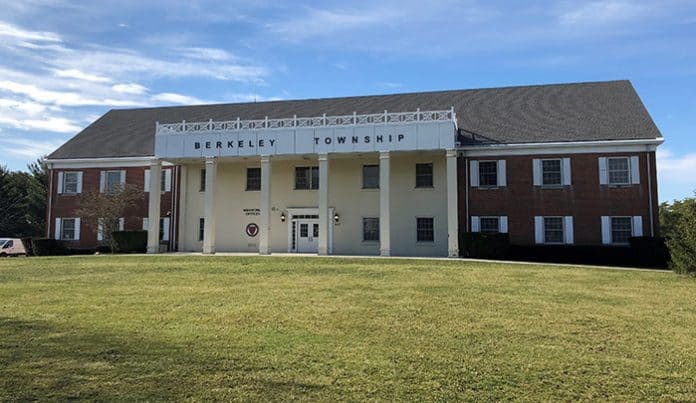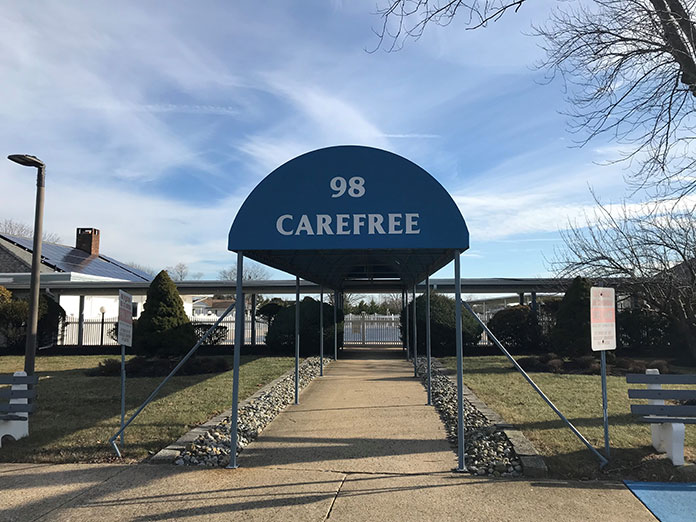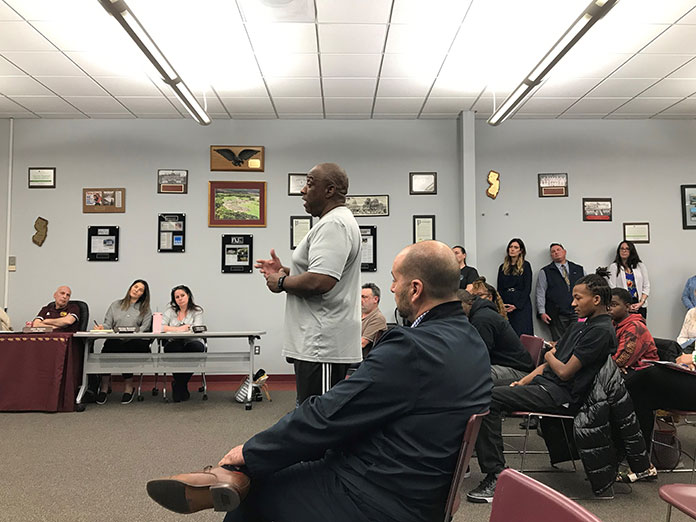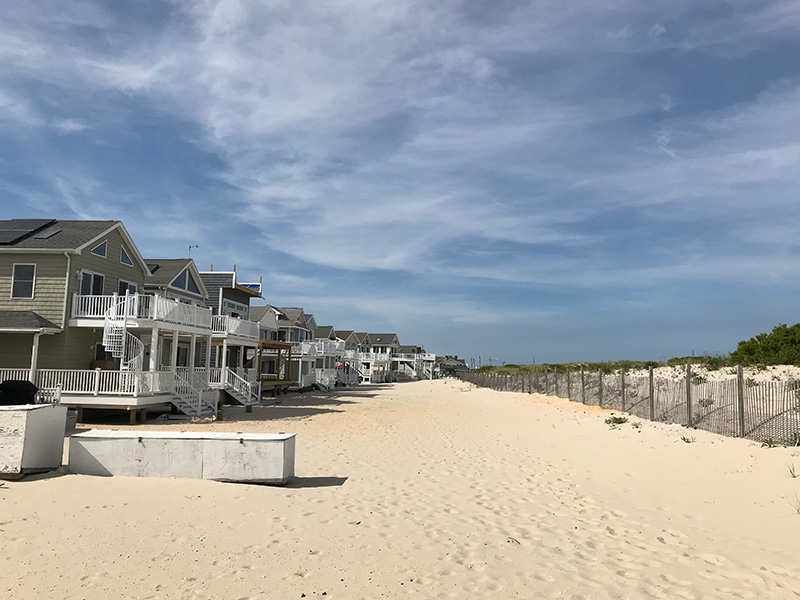
BERKELEY – The biggest stories of this year in Berkeley all featured conflict. Whether it was the town fighting the state, residents fighting officials, or politicians fighting each other – there were some heated discussions. Some got resolved, and some did not.
55+ Protections Passed
The Township Council approved an ordinance that would add age restrictions in retirement communities to the township code.
The ordinance changed the definition of “Planned Residential Retirement Community” in town. Homeowner associations have their own bylaws restricting who can live there. The new ordinance is a town law that would reinforce the existing bylaws.
Mayor Carmen Amato said that this ordinance codifies what the bylaws already state. It will keep these neighborhoods the way seniors want them.

“The ordinance will not change any of the bylaws of the homeowner association in which you live,” township attorney Lauren Staiger had previously said. She also noted that Berkeley is not regulating whether your grandchildren can live with you.
This move was popular with seniors in the area, who filled a clubhouse to hear about it. Realtors fought back, stating that the ordinance was unconstitutional.
On a regular basis, a state bill is drafted that is designed to weaken the age limit in senior communities. The governing body opposes that every time.
Other Senior Protections
A number of state and federal laws have been on the minds of seniors in town. One of them involves COVID-19 lawsuits.
If someone contracts the virus in a common area, such as a clubhouse, could they sue the senior development? Could they sue the trustees – as a board and individually? In this litigious society, it doesn’t matter if you can prove that you caught the virus at the clubhouse or not. The lawsuit would be financially devastating either way.
There had been a law that provided legal immunity from COVID-related lawsuits against planned real estate developments, but it expired on January 1, 2022.
Lawmakers proposed an extension to this law, and the mayor and council supported it.
The governing body also asked the federal government to increase Social Security for seniors to keep up with inflation.
“Racist” Social Media Posts
A Central Regional Board of Education member’s social media posts were called racist by members of the public.
Heather Koenig joined the board in January as a representative from Berkeley. Her posts were memes – pictures with text on them that she shared from other accounts. Of the three that were shown to The Berkeley Times, only one had her own words. “Sorry but not sorry” was written when the image was shared. This one showed a Black man complaining about the Jan. 6 insurrection attempt using slang. Another post compared a veteran’s struggle to an athlete’s bad behavior with a tag line “Stop making stupid people famous.” And the third attempted to call out what critics say is the hypocrisy of Black Lives Matter.

“There’s always two sides to a story,” she said. “Only one side is being taken. Something was taken out of context.”
Students came forward to speak of racism they have encountered from other kids – and even from staff. Parents said that race issues have been a problem in the area since they were young.
While the board member’s right to post such things is protected by the 1st Amendment, critics said that she should understand that her role is as a leader who represents all constituents.
Later, a relative of another board member, Merissa Borawski, allegedly posted anti-gay and anti-Black statements online. Koenig and Borawski ran together last year.
The board instituted a social media policy which read, in part, that a school board member must avoid conduct on social media that would violate the School Ethics Act.
A number of other changes followed, including establishing an equity committee, a gay-straight alliance club, a people of color club, education and awareness training for staff.
“Historically, around the globe and here at Central Regional School District, people have been and continue to be, categorized by their differences, and with that categorization comes inequalities. We understand that persons characterized by their differences continue to be disadvantaged because of these differences and social structures which are often not visible. Our district realizes we need to be better. Through education, our district aims to understand and challenge these existing structures, with the goal to remove barriers in order to create a safer and more inclusive school community. Our district will be doing everything possible to ensure all students feel nurtured and safe,” Superintendent Triantafillos Parlapanides said in a statement.
South Seaside Park’s Pending Exit
A Superior Court Judge decided that South Seaside Park can leave Berkeley Township and petition to join Seaside Park. Township officials announced that they will appeal this decision.
For many years, residents in SSP have claimed that they are not treated as equals by the rest of Berkeley. By a strange quirk of history, this area – which is between the borough of Seaside Park and Island Beach State Park – is part of Berkeley Township.
Shore residents usually pay more in taxes than mainland because it’s a desirable place to live. Some SSP residents have said they have felt marooned by the township, receiving less services. They feel that they have more in common with Seaside Park and might be better off there.

If this area left, the mainland residents would see an increase in taxes.
The Planning Board had 38 hearings on the issue from 2015 to 2019. In 2020, the Planning Board issued a resolution suggesting that the Township Council deny de-annexation. The Council agreed. Then SSP challenged the council’s vote in court.
Judge Marlene Lynch-Ford agreed with SSP that they should be allowed to de-annex.
The appeal process will likely take more than a year, said Don Whiteman, who led the de-annexation movement. If the court still agrees with de-annexation, then SSP residents will have to vote on it. If they agree to leave, they still can’t if the Township Council won’t let them.
Manitou Schoolhouse
The Manitou Park schoolhouse has been a dangerous, abandoned building for quite some time. It used to be a segregated school decades ago.
The township has long wanted it to become a community center. The council awarded a contract to a company to stabilize the old schoolhouse in the amount of $326,000. “This is to do remedial work before the architect comes in,” township engineer Alan Dittenhofer said.
Mayor Carmen Amato said that a few years ago the town received a grant that is given to towns trying to preserve and update historical buildings and that’s where the money is coming from for this.
New Hospitals
The 86,000 square-foot Children’s Specialized Hospital of the Community Medical Center and RWJBarnabas Health Medical Group broke ground at 1251 Route 37 West. Upon its completion, the three-story medical building will be shared by CMC and CSH, as well as RWJBarnabas Health Medical Group Orthopedic and Primary Care services.
CMC Chief Executive Officer Patrick Ahearn said they are expecting to open next year. “We’ll have about 10 of our physicians from Community Medical Center in the building and there’ll be 20 or so from Children’s Specialized Hospital if not more than that. We’ll be one of their major locations for kids.
Ground was also broken for the new Veterans Administration clinic at 1051 Hooper Avenue. The ceremony was on Caudina Avenue, which is the back road past two banks that leads to the Seacourt Mall. It is expected to open in spring of 2024.
Currently, veterans travel to Brick’s James J. Howard Outpatient Clinic for their needs. They have complained that the facility is understaffed and that it doesn’t have enough parking. Also, some of them have to travel up to East Orange for certain services.
The new building will be about twice the size of the current clinic, measuring 68,000 square feet. It will neighbor the county’s new social services building when that’s completed. There is also a bus stop and other amenities nearby.
Officials at the groundbreaking said that the building will enhance services currently provided, and will also add more. Some of the specialties noted during the presentation was primary care, mental health, dental, podiatry, and women’s health, which is the fastest growing department.
Sex Ed Controversy
The state updates their guidelines on a regular basis, but this year it became a culture war that played out in school board meetings throughout the state.
In 2020, the state updated their Comprehensive Health and Physical Education guidelines, and it encompasses a great deal more than sex and gender. It is 66 pages. There are entire pages on fitness, and just a few sentences on gender identity, but that is what some parents are concerned about. Other topics include addiction, nutrition, and resolving conflicts.
The state’s guidelines can be found here:nj.gov/education/cccs/2020/2020%20NJSLS-CHPE.pdf
Research shows that these more comprehensive approaches reduce teen pregnancy, delay the age at which teens commence sexual activity, lessen the spread of sexually transmitted infections, and promote teen health overall.
However, religious and conservative groups have questioned these standards, afraid that they are “indoctrinating” kids into lifestyles of which the parents wouldn’t approve. Examples of sex ed materials have been spread on social media, regardless of whether they were actually going to be used in a classroom.
Some parents who say they are not being political argued that they should be the ones having these conversations with the children.
Every local district was allowed by the state to interpret the guidelines their own way. Some still have not.
Split Republican Party
Ocean County’s Republicans have been divided. Former leader George Gilmore had been convicted of tax fraud but was pardoned on President Donald Trump’s last day in office.
Frank Holman ran the county Republicans after Gilmore. He stepped aside as Sheriff Michael Mastronardy ran to take the position but lost to Gilmore by a vote of 333 to 320.

Former Brick Councilwoman Ruthanne Scaturro was on the ballot as Gilmore’s running mate and became his vice chair. Scaturro secured 325 votes putting her in the lead over her opponent Barbara Lanuto, who received 311 votes.
Democrat Challenged
Longtime Democrat County Chairman Wyatt Earp was challenged by former Toms River Councilman Terrance Turnbach. Earp won 260 votes to 204.
Earp has run the county Democrats for 16 years. Turnbach said he wanted to energize and repopulate the Democrats to make them more competitive in Ocean County, which is largely a Republican area.






